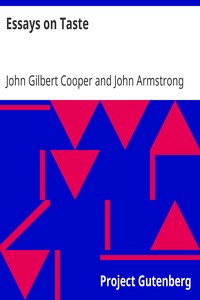Essays on Taste by John Gilbert Cooper and John Armstrong
"Essays on Taste" by John Gilbert Cooper and John Armstrong is a collection of philosophical essays focusing on aesthetics and the concept of taste, published during the mid-18th century, specifically the late 1750s to 1770. This work reflects the evolving ideas about the nature of beauty and artistic judgment characteristic of the period, which sits between the earlier classic traditions and the emerging romantic sentiments. The essays explore personal perceptions of beauty,
the moral considerations of art, and the interplay between individual sensibility and societal standards in discerning taste. The book is composed of selected letters and essays that delve into the significance of taste as an essential human quality. Cooper emphasizes that taste is an instinctive response linked to an internal harmony, while he also engages with the moral implications of aesthetic appreciation. On the other hand, Armstrong critiques popular criticism and advocates for individual discernment in appreciating art and literature. He highlights that true taste is not confined to established norms but can emerge from diverse backgrounds. Throughout the essays, both writers examine the relationship between beauty, truth, and individual perception, underscoring the subjective experience of art and the inherent moral dimensions involved. (This is an automatically generated summary.)
Read or download for free
| How to read | Url | Size | |||
|---|---|---|---|---|---|
| Read now! | https://www.gutenberg.org/ebooks/13464.html.images | 90 kB | |||
| EPUB3 (E-readers incl. Send-to-Kindle) | https://www.gutenberg.org/ebooks/13464.epub3.images | 109 kB | |||
| EPUB (older E-readers) | https://www.gutenberg.org/ebooks/13464.epub.images | 108 kB | |||
| EPUB (no images, older E-readers) | https://www.gutenberg.org/ebooks/13464.epub.noimages | 88 kB | |||
| Kindle | https://www.gutenberg.org/ebooks/13464.kf8.images | 222 kB | |||
| older Kindles | https://www.gutenberg.org/ebooks/13464.kindle.images | 209 kB | |||
| Plain Text UTF-8 | https://www.gutenberg.org/ebooks/13464.txt.utf-8 | 75 kB | |||
| Download HTML (zip) | https://www.gutenberg.org/cache/epub/13464/pg13464-h.zip | 108 kB | |||
| There may be more files related to this item. | |||||
Similar Books
About this eBook
| Author | Cooper, John Gilbert, 1723-1769 |
|---|---|
| Author | Armstrong, John, 1709-1779 |
| Author of introduction, etc. | Cohen, Ralph, 1917-2016 |
| Title | Essays on Taste |
| Note | Augustan Reprint Society, publication number 30 |
| Note | Reading ease score: 55.8 (10th to 12th grade). Somewhat difficult to read. |
| Credits | Produced by S.R.Ellison, David Starner, and the Online Distributed Proofreading Team |
| Language | English |
| LoC Class | PR: Language and Literatures: English literature |
| Subject | Aesthetics |
| Category | Text |
| EBook-No. | 13464 |
| Release Date | Sep 15, 2004 |
| Most Recently Updated | May 24, 2025 |
| Copyright Status | Public domain in the USA. |
| Downloads | 99 downloads in the last 30 days. |
| Project Gutenberg eBooks are always free! | |


